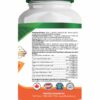Cough & Cold ( 50 mg Ocimum Tenuiflorum ) Halal Gelatin Free Capsules
$19.99
A common cold can be a frequent experience for many people. While it is important to manage your symptoms—chills, a sore throat, cough, sneezing, and congestion—you may want to take a few steps to help boost your immune system, since exposures to viruses and bacteria can weaken the body’s defenses. Supplements can benefit your overall well-being.
Recommended dose: Adults: 1 Capsule(s) 2 time(s) per day. Take one capsule 2 times per day or as directed by healthcare practitioner.
Duration of use: Consult a healthcare practitioner for use beyond 4-6 weeks.
Recommended use: Licorice is traditionally used in Herbal medicine as an expectorant to help relieve chest complaints such as catarrhs, cough and bronchitis.

Out of stock
Description
WHAT IS COUGH AND COLD?
The common cold is medically referred to as a viral upper respiratory tract infection. Symptoms of the common cold may include cough, sore throat, low-grade fever, nasal congestion, runny nose, and sneezing. The common cold is a viral infection of your nose and throat (upper respiratory tract). It’s usually harmless, although it might not feel that way. Many types of viruses can cause a common cold. Healthy adults can expect to have two or three colds each year. Infants and young children may have even more frequent colds. Most people recover from a common cold in a week or 10 days. Symptoms might last longer in people who smoke. Generally, you don’t need medical attention for a common cold.
A common cold can be brought on by numerous viral strains. Two to three colds a year are normal for healthy persons. Young toddlers and infants may have colds more frequently. The majority of people get over a cold in a week to ten days. Smokers may experience symptoms that linger longer. Sometimes taking few simple supplements can be good.
Symptoms:
Symptoms of a common cold usually appear one to three days after exposure to a cold-causing virus. Signs and symptoms, which can vary from person to person, might include:
Runny or stuffy nose:
A stuffy or congested nose occurs when the tissues lining it become swollen. The swelling is due to inflamed blood vessels. The problem may also include nasal discharge or “runny nose.” If excess mucus runs down the back of your throat (postnasal drip), it may cause a cough or sore throat.
- Sore throat: A sore throat is often a symptom of colds or flu – you may also have a blocked or runny nose, a cough, a high temperature (fever), a headache and general aches. laryngitis (inflammation of the voice box) – you may also have a hoarse voice, a dry cough and a constant need to clear your throat.
- Cough: Common colds turn into chest colds when the virus travels from the nose and throat to the lungs. Occasionally, bacteria cause chest colds. You can have a cough with a common cold or a chest cold. But chest colds produce a wet cough, meaning you may feel or cough up phlegm.
- Slight body aches or a mild headache: What may seem like a cold could be the flu. Symptoms include fever or feverish/chills, cough, muscle or body aches, headache, fatigue, runny or stuffy nose and sore throat. Allergies are typically chronic conditions presenting with symptoms off and on depending perhaps on the season or your environment.
- Sneezing: The common cold is very easily spread to others. It’s often spread through airborne droplets that are coughed or sneezed into the air by the sick person. The droplets are then inhaled by another person. Symptoms may include a stuffy, runny nose, scratchy, tickly throat, sneezing, watery eyes and a low-grade fever.
- Low-grade fever: Respiratory infections can cause a persistent low grade fever. Some of the most common respiratory infections, such as a cold or the flu, may cause a low-grade fever that lasts for as long as the body takes to fight off the infection.
The discharge from your nose may start out clear and become thicker and yellow or green as a common cold runs its course. This doesn’t usually mean you have a bacterial infection.
Treatment: The common cold is a viral infection in your upper respiratory tract. Viruses cannot be treated with antibiotics. In most cases, viruses like the cold just need to run their course. You can treat the symptoms of the infection, but you can’t actually treat the infection itself.
- Sip warm liquids. A cold remedy used in many cultures, taking in warm liquids, such as chicken soup, tea or warm apple juice, might be soothing and might ease congestion by increasing mucus flow.
Try honey. Honey may help coughs in adults and children who are older than age 1. Try it in hot tea.














